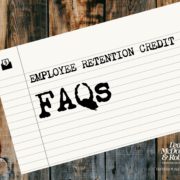Congressional Hearing on Employee Retention Credit
The Oversight Subcommittee of the House Ways & Means Committee held a hearing on July 27, 2023, to address issues related to the Employee Retention Credit. One of the most significant concerns discussed was fraudulent activities, where ERC mills posing as experts are attempting to persuade ineligible employers to file for the Employee Retention Credit. Wrongfully filing for the ERC not only impacts employers themselves as they unknowingly engage in fraudulent practices but also impacts credible tax professionals by making their clients believe they are being unjustly deprived of the credit.
What is the ERC?
Initially launched during the COVID-19 pandemic, the Employee Retention Credit (ERC) is designed to encourage employers to retain their workforce during challenging times by offering a tax credit against certain employment taxes. Employers that qualify can claim a credit for a percentage of qualified wages paid to employees. When used appropriately, the ERC serves as an incentive to maintain employment relationships and preserve jobs, all while easing economic strain on businesses.
What are the current issues with Employee Retention Credit?
Unfortunately, ERC mills are blurring the lines with qualifying and non-qualifying employers. Some current issues include:
- Employers are receiving mixed signals, as honest tax professionals may say that they do not qualify, while ERC mills say that they do.
- ERC mills are stealing clients from tax firms and making those firms appear inept.
- ERC mills also charge large fees, which can leave the taxpayer in debt when they are denied the ERC.
- The ERC has led to an immense number of amended returns needing to be processed. This has created a backlog in the system.
- There is currently no way of checking on the status of an ERC claim, which is causing frustration.
Possible Solutions to ERC Disruptions
There are some possible solutions to current ERC disruptions that taxpayers should know about. The Congressional Committee has considered creating an amnesty program to help avoid fraud. However, the issue with this is that it would help the taxpayers but allow the ERC mills to keep their unlawful profits.
Additionally, the IRS would like to encourage taxpayer cooperation and ask them to provide information in order to identify and take action against the ERC mills. A soft letter program has been proposed as well. And finally, the IRS appears to be having success with electronic returns, as they can be processed much more quickly than paper returns.
Addressing ERC will be difficult to accomplish in one fell swoop. Congress is currently focused on other issues, making the passing of new legislation unlikely in the near future. The best thing that taxpayers can do is educate themselves on the Employee Retention Credit and consult with a trusted tax professional to evaluate whether or not they qualify for the credit. Taxpayers must be wary of opportunities that seem “too good to be true,” as that often means that an ERC mill is coercing them to commit fraud.










